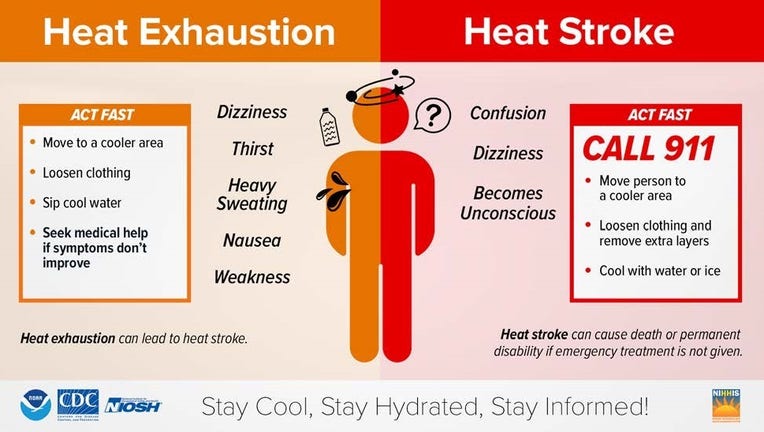Heat exhaustion vs. heat stroke: Symptoms, what's the difference, what to do

(Photo courtesy of National Weather Service)
HOUSTON - Summers in Texas aren't just hot, they can be dangerous too.
Exposure to high temperatures can lead to heat stroke and heat exhaustion. They are both heat-related illnesses, but they differ in severity and symptoms.
SUGGESTED: Staying safe in dangerously high temperatures after heat advisory issued for Texas
Being able to identify each of the conditions can help you determine what steps you should take and when it's a medical emergency.
Here are the key signs of each condition.
Signs of Heat Exhaustion
1. Heavy sweating
2. Weakness or fatigue
3. Dizziness or fainting
4. Nausea or vomiting
5. Headache
6. Cold, pale, and clammy skin
7. Rapid, weak pulse
8. Muscle cramps
Signs of Heat Stroke
1. High body temperature (above 103°F or 39.4°C)
2. Hot, red, dry, or moist skin
3. Rapid, strong pulse
4. Throbbing headache
5. Dizziness or lightheadedness
6. Nausea or vomiting
7. Confusion, agitation, or disorientation
8. Seizures
9. Loss of consciousness

Staying safe after heat advisory issued for Texas
A heat advisory issued for Texas residents can be dangerous. So as FOX 26?s Damali Keith tells us there are certain precautions we need to take to stay safe.
What is the difference between heat exhaustion and heat stroke?
Heat stroke is a more severe condition and requires immediate medical attention, as it can be life-threatening. If you suspect someone is experiencing heat stroke, call emergency services and try to cool them down while waiting for help to arrive.
On the other hand, the Centers for Disease Control and Prevention says heat exhaustion can often be treated by moving to a cooler place, drinking water, and resting. However, if symptoms worsen or do not improve within an hour, seek medical help, as heat exhaustion can progress to heat stroke if not properly managed.
SEE HERE: Cooling centers to escape the heat this summer
What to do
If you or someone you know is experiencing heat stroke, the CDC says you should call 911 immediately, move the person to a cooler place and use cool cloths or a cool bath to help lower their body temperature. However, the CDC says if someone is experiencing heat stroke, you should not give them anything to drink while they wait for medical help.
If you are experiencing heat exhaustion, the CDC says you should move to a cooler place loosen your clothes, put cool cloths on your body or take a cool bath, and sip on water. If you are throwing up, or if your symptoms get worse or last longer than an hour, the CDC says you should seek medical help.
To learn more about heat-related illnesses and prevention, visit the CDC website.

